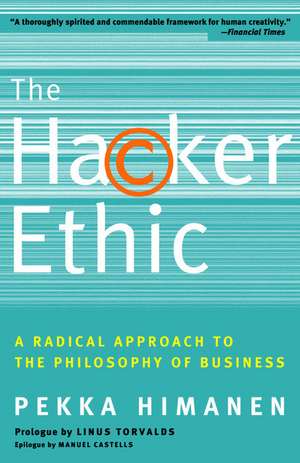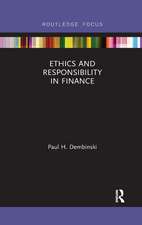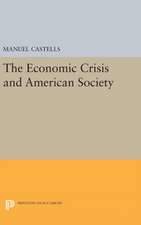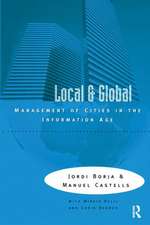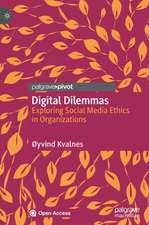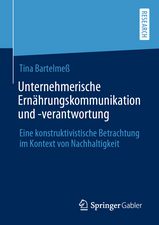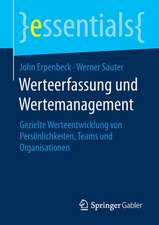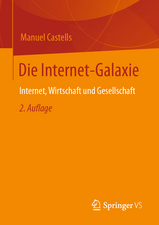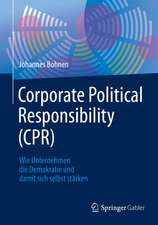The Hacker Ethic: A Radical Approach to the Philosophy of Business
Linus Torvalds Autor Pekka Himanen Manuel Castellsen Limba Engleză Paperback – 31 ian 2002
Without hackers there would be no universal access to e-mail, no Internet, no World Wide Web, but the hacker ethic has spread far beyond the world of computers. It is a mind-set, a philosophy, based on the values of play, passion, sharing, and creativity, that has the potential to enhance every individual’s and company’s productivity and competitiveness. Now there is a greater need than ever for entrepreneurial versatility of the sort that has made hackers the most important innovators of our day. Pekka Himanen shows how we all can make use of this ongoing transformation in the way we approach our working lives.
Preț: 110.36 lei
Nou
Puncte Express: 166
Preț estimativ în valută:
21.12€ • 21.97$ • 17.44£
21.12€ • 21.97$ • 17.44£
Carte tipărită la comandă
Livrare economică 14-28 aprilie
Preluare comenzi: 021 569.72.76
Specificații
ISBN-13: 9780375758782
ISBN-10: 037575878X
Pagini: 256
Dimensiuni: 142 x 219 x 14 mm
Greutate: 0.31 kg
Editura: Random House Trade
ISBN-10: 037575878X
Pagini: 256
Dimensiuni: 142 x 219 x 14 mm
Greutate: 0.31 kg
Editura: Random House Trade
Notă biografică
Pekka Himanen earned his Ph.D. in philosophy from the University of Helsinki at the age of twenty. His ongoing mapping of the meaning of technological development has brought him into dialouge with academics, artists, ministers, and CEOs. Himanen works at the University of Helsinki and at the University of California at Berkeley.
Linus Torvalds has become one of the most respected hackers within the computer community for creating the Linux operating system in 1991 while a student at the University of Helsinki. Since then, Linux has grown into a project involving thousands of programmers and millions of users worldwide.
Manuel Castells is a professor of sociology at the University of California at Berkeley. He is the author of the highly acclaimed trilogy The Information Age and of The City of the Grassroots (winnter of the 1983 C. Wright Mills Award) and of more than twenty other books.
From the Hardcover edition.
Linus Torvalds has become one of the most respected hackers within the computer community for creating the Linux operating system in 1991 while a student at the University of Helsinki. Since then, Linux has grown into a project involving thousands of programmers and millions of users worldwide.
Manuel Castells is a professor of sociology at the University of California at Berkeley. He is the author of the highly acclaimed trilogy The Information Age and of The City of the Grassroots (winnter of the 1983 C. Wright Mills Award) and of more than twenty other books.
From the Hardcover edition.
Extras
At the core of our technological time stands a fascinating group of people who call themselves hackers. They are not TV celebrities with wide name recognition, but everyone knows their achievements, which form a large part of our new, emerging society's technological basis: the Internet and the Web (which together can be called the Net), the personal computer, and an important portion of the software used for running them. The hackers' "jargon file," compiled collectively on the Net, defines them as people who "program enthusiastically"' and who believe that "information-sharing is a powerful positive good, and that it is an ethical duty of hackers to share their expertise by writing free software and facilitating access to information and to computing resources wherever possible." This has been the hacker ethic ever since a group of MIT's passionate programmers started calling themselves hackers in the early sixties. (Later, in the mid-eighties, the media started applying the term to computer criminals. In order to avoid the confusion with virus writers and intruders into information systems, hackers began calling these destructive computer users crackers. In this book, this distinction between hackers and crackers is observed.)
My own initial interest in these hackers was technological, related to the impressive fact that the best-known symbols of our time-the Net, the personal computer, and software such as the Linux operating system-were actually developed not by enterprises or governments but were created primarily by some enthusiastic individuals who just started to realize their ideas with other like-minded individuals working in a free rhythm. (Those who are interested in the details of their development may turn to the appendix, "A Brief History of Computer Hackerism," for details of their development.) I wanted to understand the internal logic of this activity, its driving forces. However, the more I thought about computer hackers, the more obvious it became that what was even more interesting about them, in human terms, was the fact that these hackers represented a much larger spiritual challenge to our time. Computer hackers themselves have always admitted this wider applicability of their ways. Their "jargon file" emphasizes that a hacker is basically "an expert or enthusiast of any kind. One might be an astronomy hacker, for example." In this sense, a person can be a hacker without having anything to do with computers.
The main question transformed into, What if we look at hackers from a wider perspective? What does their challenge then mean? Looking at the hacker ethic in this way, it becomes a name for a general passionate relationship to work that is developing in our information age. From this perspective, the hacker ethic is a new work ethic that challenges the attitude to work that has held us in its thrall for so long, the Protestant work ethic, as explicated in Max Weber's classic The Protestant Ethic and the Spirit of Capitalism (1904-1905).
To some computer hackers, this kind of linking of the hacker ethic to Weber may at first seem alien. They should keep in mind that in this book the expression hacker ethic is used in a sense that extends beyond computer backerism, and that for this reason it confronts social forces that are not normally considered in discussions concerned exclusively with computers. This expansion of the hacker ethic thus presents an intellectual challenge to computer hackers, as well.
But first and foremost the hacker ethic is a challenge to our society and to each of our lives. Besides the work ethic, the second important level of this challenge is the hacker money ethic-a level that Weber defined as the other main component of the Protestant ethic. Clearly, the "information-sharing" mentioned in the hacker-ethic definition cited above is not the dominant way of making money in our time; on the contrary, money is mostly made by information-owning. Neither is the first hackers' ethos-that activity should be motivated primarily not by money but rather by a desire to create something that one's peer community would find valuable-a common attitude. While we cannot claim that all present computer hackers share this money ethic or that it is likely to spread into society at large, as we can about their work ethic, we can say that it has been an important force in the formation of our time and that the hackers' debate over the nature of the information economy could lead to consequences at least as radical as those of their work ethic.
The third element present within the hacker ethic from the very beginning, touched upon in the cited definition by the phrase "facilitating access to information and to computing resources," could be called their network ethic or nethic. It has addressed ideas such as freedom of expression on the Net and access to the Net for all. Most computer hackers support only some parts of this nethic, but in terms of their social significance they must be understood as a whole. The impact of these themes remains to be seen, but they definitely go to the heart of the ethical challenges of the information age.
From the Hardcover edition.
My own initial interest in these hackers was technological, related to the impressive fact that the best-known symbols of our time-the Net, the personal computer, and software such as the Linux operating system-were actually developed not by enterprises or governments but were created primarily by some enthusiastic individuals who just started to realize their ideas with other like-minded individuals working in a free rhythm. (Those who are interested in the details of their development may turn to the appendix, "A Brief History of Computer Hackerism," for details of their development.) I wanted to understand the internal logic of this activity, its driving forces. However, the more I thought about computer hackers, the more obvious it became that what was even more interesting about them, in human terms, was the fact that these hackers represented a much larger spiritual challenge to our time. Computer hackers themselves have always admitted this wider applicability of their ways. Their "jargon file" emphasizes that a hacker is basically "an expert or enthusiast of any kind. One might be an astronomy hacker, for example." In this sense, a person can be a hacker without having anything to do with computers.
The main question transformed into, What if we look at hackers from a wider perspective? What does their challenge then mean? Looking at the hacker ethic in this way, it becomes a name for a general passionate relationship to work that is developing in our information age. From this perspective, the hacker ethic is a new work ethic that challenges the attitude to work that has held us in its thrall for so long, the Protestant work ethic, as explicated in Max Weber's classic The Protestant Ethic and the Spirit of Capitalism (1904-1905).
To some computer hackers, this kind of linking of the hacker ethic to Weber may at first seem alien. They should keep in mind that in this book the expression hacker ethic is used in a sense that extends beyond computer backerism, and that for this reason it confronts social forces that are not normally considered in discussions concerned exclusively with computers. This expansion of the hacker ethic thus presents an intellectual challenge to computer hackers, as well.
But first and foremost the hacker ethic is a challenge to our society and to each of our lives. Besides the work ethic, the second important level of this challenge is the hacker money ethic-a level that Weber defined as the other main component of the Protestant ethic. Clearly, the "information-sharing" mentioned in the hacker-ethic definition cited above is not the dominant way of making money in our time; on the contrary, money is mostly made by information-owning. Neither is the first hackers' ethos-that activity should be motivated primarily not by money but rather by a desire to create something that one's peer community would find valuable-a common attitude. While we cannot claim that all present computer hackers share this money ethic or that it is likely to spread into society at large, as we can about their work ethic, we can say that it has been an important force in the formation of our time and that the hackers' debate over the nature of the information economy could lead to consequences at least as radical as those of their work ethic.
The third element present within the hacker ethic from the very beginning, touched upon in the cited definition by the phrase "facilitating access to information and to computing resources," could be called their network ethic or nethic. It has addressed ideas such as freedom of expression on the Net and access to the Net for all. Most computer hackers support only some parts of this nethic, but in terms of their social significance they must be understood as a whole. The impact of these themes remains to be seen, but they definitely go to the heart of the ethical challenges of the information age.
From the Hardcover edition.
Recenzii
“A person can be a hacker without having anything to do with computers.”
—Pekka Himanen
“A thoroughly spirited and commendable framework for human creativity.”
—Financial Times
“As comprehensive and instructive as any [survey] to date... Himanen has a powerful grasp on that strangely intoxicating contradiction that is open-source.”
—The New York Times Book Review
“Engagingly written and provocative, and indubitably commendable in its vision of a transformation of how all of us relate to our working life....We should all be more like hackers.”
—Salon.com
—Pekka Himanen
“A thoroughly spirited and commendable framework for human creativity.”
—Financial Times
“As comprehensive and instructive as any [survey] to date... Himanen has a powerful grasp on that strangely intoxicating contradiction that is open-source.”
—The New York Times Book Review
“Engagingly written and provocative, and indubitably commendable in its vision of a transformation of how all of us relate to our working life....We should all be more like hackers.”
—Salon.com
